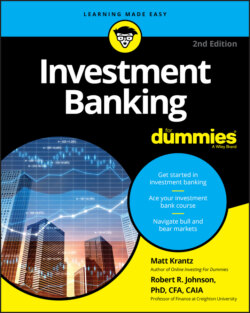Читать книгу Investment Banking For Dummies - Matthew Krantz - Страница 13
The role investment banking plays
ОглавлениеInvestment bankers get involved in the very early stages of funding a new project or endeavor. Investment bankers are typically contacted by people, companies, or governments who need cash to start businesses, expand factories, and build schools or bridges. Representatives from the investment banking operation then find investors or organizations like pension plans, mutual funds, and private investors who have more cash than they know what to do with (a nice problem to have) and who want a return for the use of their funds. Investment banks also offer advice regarding what investment securities should be bought or the ones an investor may want to buy.
One of the trickiest parts of understanding investment banking is that it’s typically a menu of financial services. Some investment banking operations may offer some services, but not others.
The services offered by investment banks typically fall into one of a few buckets. One of the best ways to understand investment banks is to examine all the functions that some of the biggest investment banks perform. For example, Morgan Stanley, one of the world’s largest investment banks, has its hands in several key business areas, including the following:
Capital raising: This part of the investment banking function helps companies and organizations generate money from investors. This is typically done by selling shares of stock or debt.
Financial advisory: In this role, the investment banking operation is hired to help a company or government make decisions on managing their financial resources. Advice may pertain to whether to buy another company or sell off part of the business. A common business decision tackled by this type of investment banking is whether to acquire another company or divest of a current product line. This is called mergers and acquisitions (M&A) advisory.
Corporate lending: Investment banks typically help companies and other large borrowers sell securities to raise money. But large investment banks are also frequently involved in extending loans to their customers, often short-term loans (called bridge loans) to tide a company over while another transaction is in the works.
Sales and trading: Investment bankers are a creative and innovative lot, in the business of constructing financial instruments to be bought and sold. It’s natural for investment bankers to also buy and sell stocks and other financial instruments either on the behalf of their clients or using their own money.
Brokerage services: Some investment banking operations include brokerage services where they may hold clients’ assets or help them conduct trades.
Research: Investment banks not only help large institutions sell securities to investors, but also assist investors looking to buy securities. Many investment banks run research units that advise investors on whether they should buy a particular investment. The terms investments and securities are pretty much interchangeable.
Investments: Investment banks typically serve the role of a middleman, sitting between the entities that need money and those that have it. But periodically, units of investment banking operations may invest their own money in promising companies or projects. This type of investment, often made in companies that don’t have investments that the public can buy, is called private equity.
Investment banking operations at one firm may be engaged in some of the preceding activities, but not all. There’s no rule that demands investment banking operations must perform all the services described here. As investment firms grow, though, they often add functions so they’re more valuable to their clients and can serve as a common source for a variety of services.
